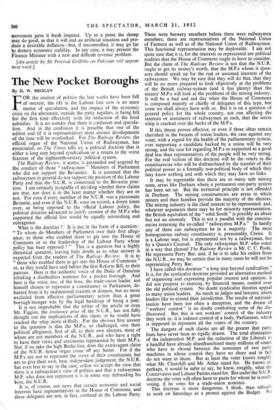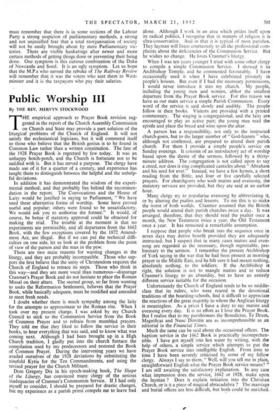The New Pocket Boroughs
By D. W. BROGAN
OR the student of politics the last weeks have been full of interest; the rift in the Labour lute now is no mere matter of speculation, and the impact of the economic crisis on the electorate, outside the party regulars, is being felt for the first time effectively with the reduction of the food subsidies. It is no wonder that there is confusion and specula- tion. And in the confusion it is possible that one of the oddest and (if it is representative) most sinister developments of the time will be overlooked. For The Railway Review, the official organ of the National Union of Railwaymen, has enunciated, so The Times tells us, a political doctrine that is either a long step beyond syndicalism or a return to the worst features of the eighteenth-century political system.
The Railway Review, it seems, is astounded and angered by the conduct of those " railwaymen " Members of Parliament who did not support the Bevanites. It is assumed that the railwaymen in general do not support the position of the Labour Party and that the N.U.R. is committed to the Bevanite posi- tion. I am certainly incapable of deciding whether these claims are true, nor does it in the least matter whether they are or not. For even if every member of the N.U.R. was a passionate Bevanite, and even if the N.U.R. were on record, a dozen times over, as being opposed to the official Labour policy, the political doctrine advanced to justify censure of the M.P.s who supported the official line would be equally astonishing and outrageous.
What is the doctrine ? It is put in the form of a question : " To whom do Members of Parliament owe their first allegi- ance; to those who enabled them to get into the House of Commons or to the leadership of the Labour Party whose policy has been opposed ? " This is a question but a highly rhetorical question, leaving little doubt as to what answer is expected from the readers of The Railway Review. It is to " those who enabled them to get into the House of Commons " or, as they would have said before the first Reform Bill, to their patrons. Here is the authentic voice of the Duke of Omnium rebuking a disobedient nominee for a pocket borough. And here is the voice, too, of the boss, the- trade-union leader, not himself chosen to represent a constituency in Parliament, de- barred from it by institutional reasons or distaste, but no more excluded from effective parliamentary action than a great borough-monger was by the legal handicap of being a peer.
It is not improbable that the writer of the article or even Mr. Figgins, the eminence grise of the N.U.R., has not fully thought out the implications of this claim, or he would have cracked the whip more skilfully. For the obvious first answer to the question is that the M.P.s, so challenged, owe their political allegiance, first of all, to their own electors, most of whom are not members of the N.U.R., and who have a right to have their views and sentiments represented by their M.P.s. Nor, if we take the high Burke line, does the extravagant claim of the N.U.R. house organ come off any better. For if the M.P.s are not to represent the views of their constituents, but are to give their own, best, independent judgement, the N.U.R. has even less to say in the case, unless we accept the view that there is a railwayman's view of politics and that a railwayman M.P. who does not represent it is in some way defrauding his boss, the N.U.R.
It is, of course, not news that certain economic and social interests have representatives in the House of Commons, and these delegates are not, in fact, confined to the Labour Party. There were brewery members before there were railwaymen members; there are representatives of the National Union of Farmers as well as of the National Union of Railwaymen. This functional representation may be deplorable. I am not quite sure that it is, for the interests so represented are political realities that the House of Commons ought to have to consider. But the claim of The Railway Review is not that the N.U.R. ought to get its money's worth, that the M.P.s whom it spon- sors should speak up for the real or assumed interests of the railwaymen. We may be sure that they will do that, that they will be no more prepared to look objectively at the problems of .the British railway-system (and it has plenty) than the miners' M.P.s will look at the problemi of the mining industry. It will be a bad and sad day when the House of Commons is composed entirely or chiefly of delegates of this type, but some we shall always have with us. But it is on a question of general policy for the whole country, not one affecting the interests or sentiments of railwaymen as such, that the union whip is cracked over the backs of the M.P.s.
If this threat proves effective, or even if these ideas remain cherished in the breasts of union leaders, the case against any voter, with a regard for the health of the parliamentary system, ever supporting a candidate backed by a union will be very strong, and the case for regarding M.P.s so supported as a good deal less than representatives of the people will be very strong. For the real victims of this doctrine will be the voters in the constituencies who will be disfranchised by the transfer of their political power to a formally non-political body of which- they may know nothing and with which they may have no links.
It may be regrettable that there are so many safe mining seats, areas like Durham where a permanent one-party system has been set up. But the territorial principle is not offended in Durham. The mining constituencies are areas in which miners and their families provide the majority of the electors. The mining industry is the chief interest to be represented, and, whatever arguments there may be for minority representation, the British equivalent of the " solid South " is possibly an abuse but not an anomaly. This is not a parallel with the constitu- encies returning the so-called " railwaymen M.P.s." In hardly any of them can railwaymen be in a majority. The most homogeneous railway constituency is, presumably, Crewe. It is a Labour seat, but is represented not by a railwayman, but by a Queen's Counsel. The only railwayman M.P. who voted in a way that pleased The Railway Review is Mr. C. C. Poole. He represents Perry Bar, and, if he is to take his orders from the N.U.R., we may be certain that in many cases he will not be representing Perry Bar.
I have called this doctrine " a long step beyond syndicalism." It is, for the syndicalist doctrine provided an alternative method of organising and expressing popular interest and opinion; it did not propose to exercise, by financial means, control over the old political system. No doubt syndicalist theories appeal to many union leaders. As much as judges and lawyers, union leaders like to extend their jurisdiction. The results of national- isation have been too often a deception, and the dream of " workers' control " is no doubt comforting some of the dis- illusioned. But this is not workers' control of the industry they work in; it is indirect control of a body, Parliament, which is supposed to represent all the voters of the country.
The dangers of such claims are all the greater that party lines have never been so rigidly drawn. The total elimination of the independent M.P. and the reduction of the Liberals to a handful have already disenfranchised many millions of voters who have to choose between the nominees of two party machines in whose control they have no share and in fact do not want to share. But at least the voter knows roughly what Mr. Churchill 'and Mr. Attlee stand for. He knows or, perhaps, it would be safer to say, he knew, roughly, what the Conservative and Labour Parties stand for. But under the N.U.R. doctrine the voter will often have to guess for whom he is really voting, if he votes for a trade-union nominee. This doctrine is more dangerous, I think, than refusals to work on Saturdays as a protest against the Budget. We must remember that there is in some sections of the Labour Party a strong suspicion of parliamentary methods, a strong and not unjustified fear that a total reorganisation of society will not be easily brought about by mere Parliamentary vic- tories. There are visible hankerings after newer and more certain methods of getting things done or preventing their being done. One symptom is this curious combination of the Duke of Newcastle and Sorel. It is an ugly symptom. Let us hope that the M.P.s who earned the rebuke of The Railway Review will remember that it was the voters who sent them to West- minster and it is the taxpayers who pay their salaries.



































 Previous page
Previous page